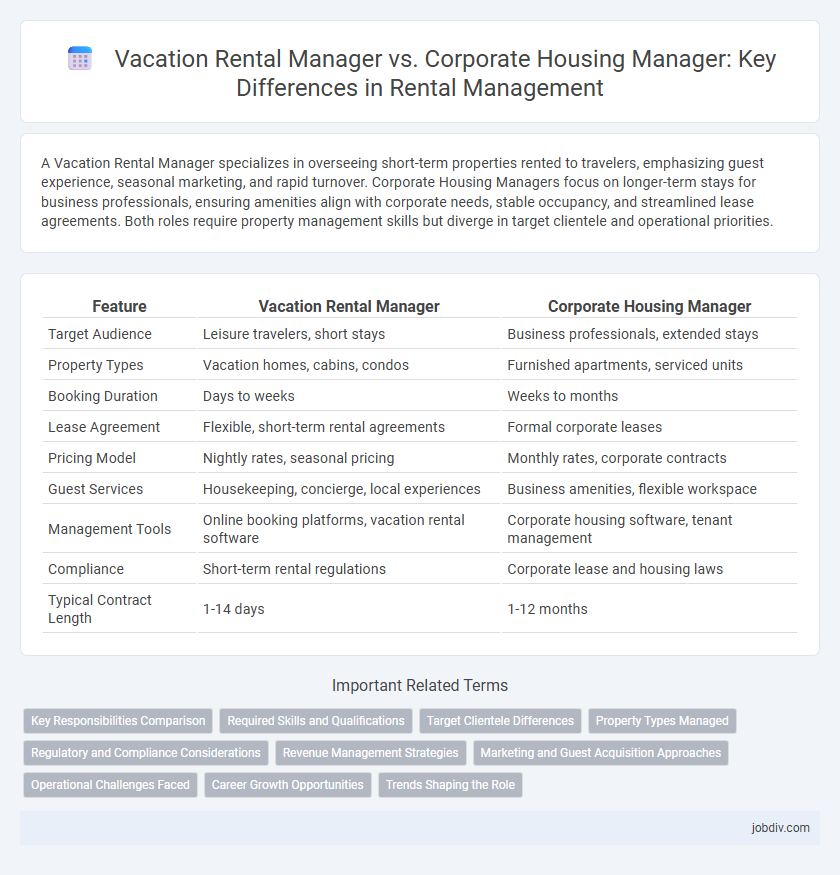A Vacation Rental Manager specializes in overseeing short-term properties rented to travelers, emphasizing guest experience, seasonal marketing, and rapid turnover. Corporate Housing Managers focus on longer-term stays for business professionals, ensuring amenities align with corporate needs, stable occupancy, and streamlined lease agreements. Both roles require property management skills but diverge in target clientele and operational priorities.
Table of Comparison
| Feature | Vacation Rental Manager | Corporate Housing Manager |
|---|---|---|
| Target Audience | Leisure travelers, short stays | Business professionals, extended stays |
| Property Types | Vacation homes, cabins, condos | Furnished apartments, serviced units |
| Booking Duration | Days to weeks | Weeks to months |
| Lease Agreement | Flexible, short-term rental agreements | Formal corporate leases |
| Pricing Model | Nightly rates, seasonal pricing | Monthly rates, corporate contracts |
| Guest Services | Housekeeping, concierge, local experiences | Business amenities, flexible workspace |
| Management Tools | Online booking platforms, vacation rental software | Corporate housing software, tenant management |
| Compliance | Short-term rental regulations | Corporate lease and housing laws |
| Typical Contract Length | 1-14 days | 1-12 months |
Key Responsibilities Comparison
Vacation rental managers oversee short-term property rentals, handling guest bookings, property maintenance, and marketing to attract tourists, ensuring a seamless guest experience. Corporate housing managers focus on longer-term stays, coordinating lease agreements, managing tenant relations, and maintaining properties to meet business traveler standards. Both roles require strategic pricing, property inspections, and adherence to local regulations, but cater to distinct tenant demographics and rental durations.
Required Skills and Qualifications
Vacation Rental Managers must excel in customer service, property maintenance oversight, and marketing strategies tailored for short-term stays, often requiring skills in dynamic pricing and guest communication platforms. Corporate Housing Managers need expertise in contract negotiation, long-term lease management, and client relationship building, with strong knowledge of corporate policies and compliance. Both roles demand proficiency in property management software, financial reporting, and local housing regulations.
Target Clientele Differences
Vacation rental managers primarily target tourists and short-term travelers seeking unique, fully furnished properties for leisure stays, emphasizing flexibility and local experiences. Corporate housing managers focus on business professionals, relocating employees, or contractors who require extended stays with amenities geared towards comfort and productivity. The distinction in clientele dictates tailored marketing strategies, property features, and service offerings aligned with either transient vacation needs or long-term business accommodations.
Property Types Managed
Vacation Rental Managers specialize in short-term, furnished properties such as beach houses, cabins, and condos designed for leisure travelers seeking unique, fully equipped accommodations. Corporate Housing Managers focus on long-term, fully serviced apartments or houses located in urban centers, tailored to business professionals needing extended stays with amenities like workspaces and flexible leases. Each manager optimizes property types based on guest profiles and duration preferences, ensuring suitable maintenance, marketing, and leasing strategies.
Regulatory and Compliance Considerations
Vacation rental managers must navigate short-term rental regulations, zoning laws, and local licensing requirements that vary widely by municipality, often facing strict limitations on rental duration and occupancy. Corporate housing managers handle compliance with longer-term lease agreements, health and safety codes, and employment-related housing standards, ensuring alignment with corporate policies and labor laws. Both roles require diligent record-keeping and adherence to tax obligations, but vacation rental managers encounter more frequent inspections and transient guest regulations.
Revenue Management Strategies
Vacation Rental Managers optimize dynamic pricing using seasonality trends and local event data to maximize occupancy and nightly rates. Corporate Housing Managers implement longer-term lease strategies, focusing on stable cash flow through negotiated monthly rates and corporate contracts. Both leverage revenue management software but tailor approaches: Vacation Rentals prioritize short-term demand fluctuations, while Corporate Housing emphasizes contract duration and tenant retention.
Marketing and Guest Acquisition Approaches
Vacation Rental Managers leverage online travel agencies (OTAs), social media marketing, and dynamic pricing tools to attract short-term travelers seeking unique, localized experiences. Corporate Housing Managers prioritize direct outreach to corporations, partnerships with relocation agencies, and targeted LinkedIn campaigns to secure long-term business clients. Both utilize data-driven marketing strategies but tailor guest acquisition approaches based on rental duration and target demographics.
Operational Challenges Faced
Vacation rental managers face operational challenges such as coordinating frequent guest turnovers and managing diverse property types across multiple locations, often relying on technology for seamless booking and maintenance schedules. Corporate housing managers encounter complexities in negotiating longer-term leases, ensuring compliance with corporate policies, and maintaining consistent quality standards for business travelers. Both roles demand efficient communication, rigorous property management systems, and adaptability to fluctuating occupancy rates to optimize revenue and guest satisfaction.
Career Growth Opportunities
Vacation rental managers often experience rapid career growth due to the dynamic nature of short-term rental markets, offering opportunities to develop skills in marketing, guest relations, and property management. Corporate housing managers typically benefit from stable, long-term contracts with consistent clientele, enabling specialization in lease negotiation and corporate client management. Both career paths provide prospects for advancement, but vacation rental management tends to offer more diverse roles and entrepreneurial possibilities.
Trends Shaping the Role
Vacation rental managers increasingly integrate advanced technology and dynamic pricing models to attract short-term travelers seeking personalized experiences. Corporate housing managers focus on extended stay solutions, emphasizing compliance, client relationships, and tailored amenities for business professionals. Both roles adapt to market demands driven by remote work flexibility, shifting traveler preferences, and evolving regulatory landscapes.
Vacation Rental Manager vs Corporate Housing Manager Infographic

 jobdiv.com
jobdiv.com